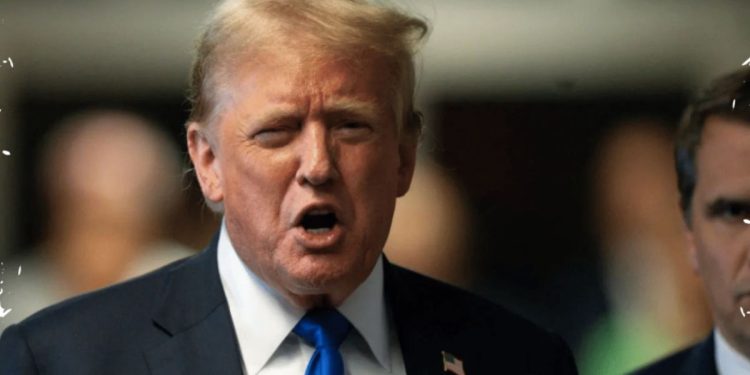Former President Trump’s New York felony conviction Thursday on 34 counts of falsifying company documents linked to a “hush money” payment to adult film star Stormy Daniels would not prevent him from becoming president if voters re-elect him, legal scholars appear to agree.
The Constitution requires only a few qualifications for the presidency: a candidate must be at least 35 years old, a natural-born citizen, and have lived in the United States for at least 14 years. It says nothing about how a felony conviction affects a president’s ability to serve.
“The short answer is yes, that there’s no constitutional bar,” said Corey Brettschneider, a lawyer, political science professor at Brown University, and author of “The Presidents and the People.” “The Constitution establishes specific criteria… However, the Constitution doesn’t explicitly state that a felony conviction disqualifies you.
“There’s a widespread understanding that the qualifications listed in the Constitution are exclusive, which means we can’t add to them,” said Derek Muller, an election law expert at the University of Notre Dame. “Having a felony conviction is irrelevant for qualification purposes,” he continued.
Jessica Levinson, a constitutional law professor at Loyola University and a CBS News contributor, stated unequivocally: “The Constitution has no prohibition on serving as president if you’re a convicted felon.”
What about the 14th Amendment?
In the aftermath of the U.S. Capitol assault on January 6, 2021, certain states have attempted to disqualify Trump based on the insurrection clause of the 14th Amendment.
In December of last year, the Colorado Supreme Court made the decision to remove Trump from the primary ballot. This was due to concerns related to the 14th Amendment and his actions surrounding January 6th. The court determined that the insurrection clause of the amendment prohibits individuals who have previously taken an oath to support the Constitution from holding public office.
The ruling in March by the U.S. Supreme Court overturned the previous decision, stating that Trump must be reinstated on the ballot. The court concluded that only Congress has the authority to enforce the insurrection clause. This decision effectively resolved the concerns raised by voters in multiple states regarding Trump’s eligibility for office.
According to Brettschneider, if there is no new statute that specifically states the disqualification, then it cannot be considered as a bar.
According to Brettschneider, the Constitution grants Congress the authority to pass legislation that upholds the 3rd section of the 14th Amendment.
What if Trump is sentenced to prison?
If Trump becomes president, the implications of his sentence could be more complex, even though it may not include prison time.
According to Muller, it is possible to be convicted of a felony without serving any time in jail. Instead, one could face alternative consequences such as fines or probation.
There are no legal restrictions preventing someone from running for president, winning an election, or serving as president while in prison.
If Trump is sentenced to prison and wins the election, his attorneys may argue that sitting presidents cannot be imprisoned, similar to Trump’s own argument that sitting presidents cannot be indicted.
According to Muller, there is a suggestion that the office of the president inherently prevents states from imprisoning individuals serving in federal office or holding federal positions. He points to historical precedent dating back 200 years, where states attempted to remove federal officers from office through legal cases. However, the Supreme Court has made it clear that states do not have the authority to do so.
What about the 25th Amendment?
According to both Muller and Levinson, the 25th Amendment could play a role in this situation.
Section 3 of the 25th Amendment states that if the vice president, along with a majority of the principal officers of the executive departments or another body designated by Congress, sends a written declaration to the president pro tempore of the Senate and the speaker of the House of Representatives stating that the president is unable to fulfill their duties, the vice president will immediately assume the role of acting president.
According to Muller, there is a valid argument that a president who is incarcerated would be unable to fulfill their duties. The ability for a convicted president serving time to have a confirmed Cabinet could hinge on the results of Senate elections, as stated by Brandon Johnson, an assistant professor at the Nebraska College of Law. Johnson wrote an essay in the Harvard Law Review last year discussing the concept of a “convict in chief.” Furthermore, if Trump were to successfully confirm a Cabinet, it is highly probable that the members would remain loyal to him and hesitant to replace him.
According to Johnson, the congressional route is unlikely to gain much traction unless there is a substantial shift in the 2024 election. He explains that Congress would need to reach an agreement to establish a body responsible for reviewing the president’s fitness for office.
According to Johnson, it appears that the most straightforward interpretation of the 25th Amendment would necessitate the vice president’s cooperation.
Johnson wrote that if the vice president’s agreement is necessary, the establishment of a congressional entity to declare the president unfit to fulfill their responsibilities may encounter similar challenges.
Could Trump pardon himself from the New York conviction?
If elected president, Trump cannot pardon himself for the New York conviction because it is a state rather than a federal one. Presidents are only able to pardon federal crimes.
Trump faces three further criminal charges: a state indictment in Georgia for claimed attempts to reverse the election, a federal indictment in Florida for his handling of secret data, and a federal indictment in Washington, D.C. for alleged efforts to overturn the presidential election.










